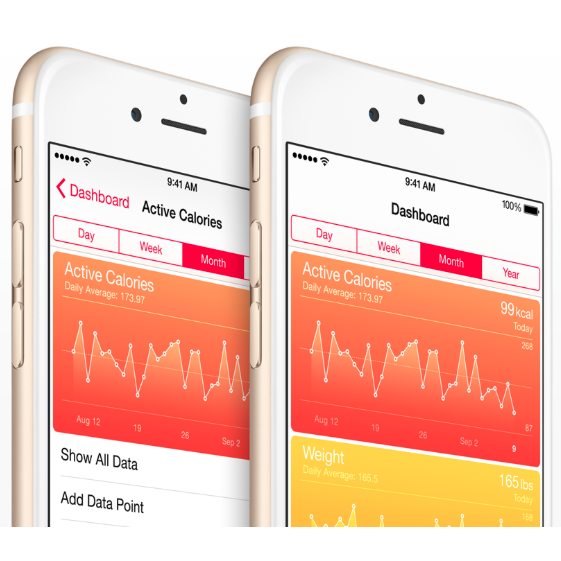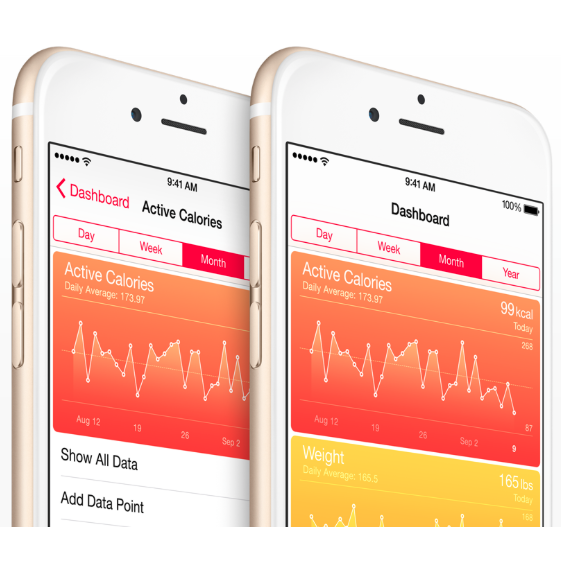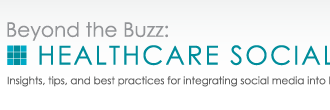

I was brave (or stupid enough) to download iOS8 on my iPhone 5 early yesterday morning at Boston’s Logan Airport. Luckily the update completed before I had to get on the plane. It was neat to see a Health icon pop up on the home screen, and I had a chance to give it a quick look. There wasn’t all that much I could do with it for now, beyond entering some basic data like height and weight, but it’s an intuitive app that fits in with the rest of Apple’s iOS offerings. We’ll have to wait for 3rd party apps to hook into Health through HealthKit, which will take awhile. And the Apple Watch isn’t out yet either.
I think Health is going to lead the market, but not dominate. Here’s my logic:
- Like other Apple innovations –think iPod and iPad– decent products already existed in those categories and were starting to get some traction. I had mp3 players and a tablet computer years before, but Apple did a better job of packaging everything up and taking usability to the next level. For me, the iTunes store differentiated the iPod and the long battery life made iPad worth ponying up for. In this case Apple is entering a market that others have already been prospecting in. Some of those others –like Fitbit– have taken a lesson from Apple and tried to make elegant products that won’t be so easily pushed out of the way by Apple mania
- The soon-to-be-introduced Apple Watch should work very smoothly with the iPhone or iPad. I’m planning to get one when it arrives, and I’m holding out hope for a high quality heart rate monitor as part of the package. This is the type of product that should evolve quickly, with new sensors and improved performance, but it will take some getting used to before I start trading in my watch every year or two and charging it up every night
- Despite the recent dustup over iCloud accounts being hacked, I do trust Apple with my personal data more than I trust competitors like Google. Apple’s business model allows it to make money by selling products and services to consumers without resorting to data mining. Apple seems to be going out of its way on the Health side to emphasize its trustworthiness. That’s a selling point competitors will have trouble matching –because data mining is the business model. More consumers are going to care about this as things move along
- One reason use of personal health data technology has been so low is that while younger people are open to it they are generally healthy and don’t need to deal with their records nearly as much. But it’s been seven years since Microsoft’s HealthVault was introduced –and those same tech-embracing folks are getting older. Also, there’s been a remarkable change in the level of use of smartphones in the past few years. They’ve gone from non-existent to ubiquitous, so Apple doesn’t need to convince people to bring another device along. The passive collection of data through sensors also makes a huge difference in ease of use and accuracy of the information. (See Health tracking apps: Not yet ready to make a big impact)
- Apple’s move is going to bring a lot of app developers into the market and we’ll see some pretty clever uses for Health before long. That will include general purpose apps and those for folks with specialized needs, like those who need to track specific parameters for a chronic illness
Makers of health apps and tools will all need to look to Apple Health to figure out how they fit in. The opportunities for data suppliers and vendors serving doctors and hospitals are there, too, but it will take at least a couple years to sort out the most promising approaches.
I look forward to going along for the ride.








